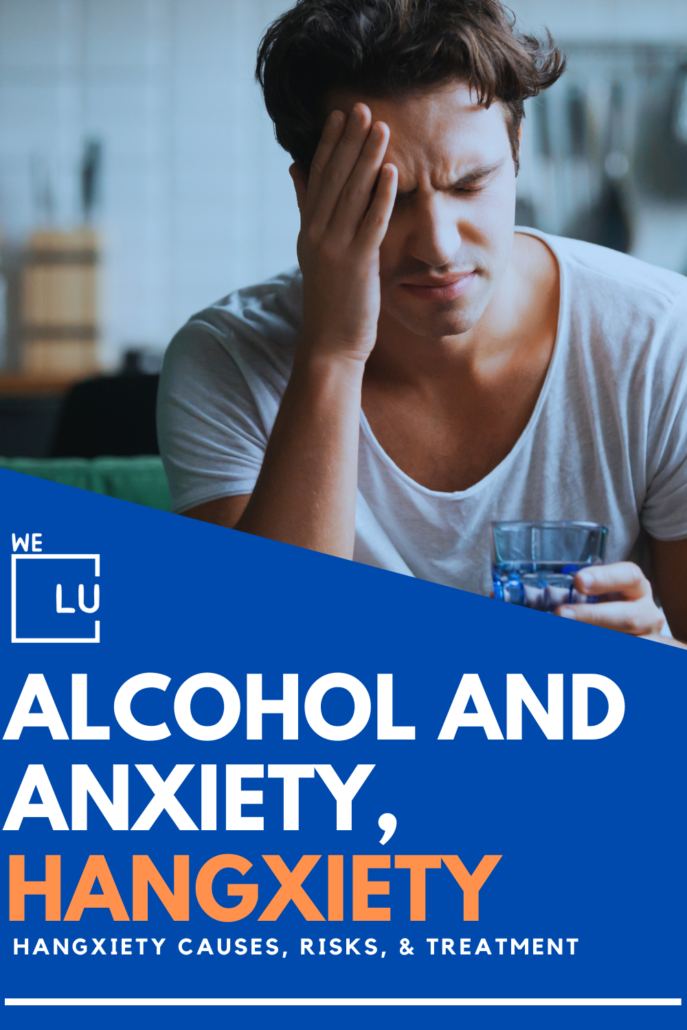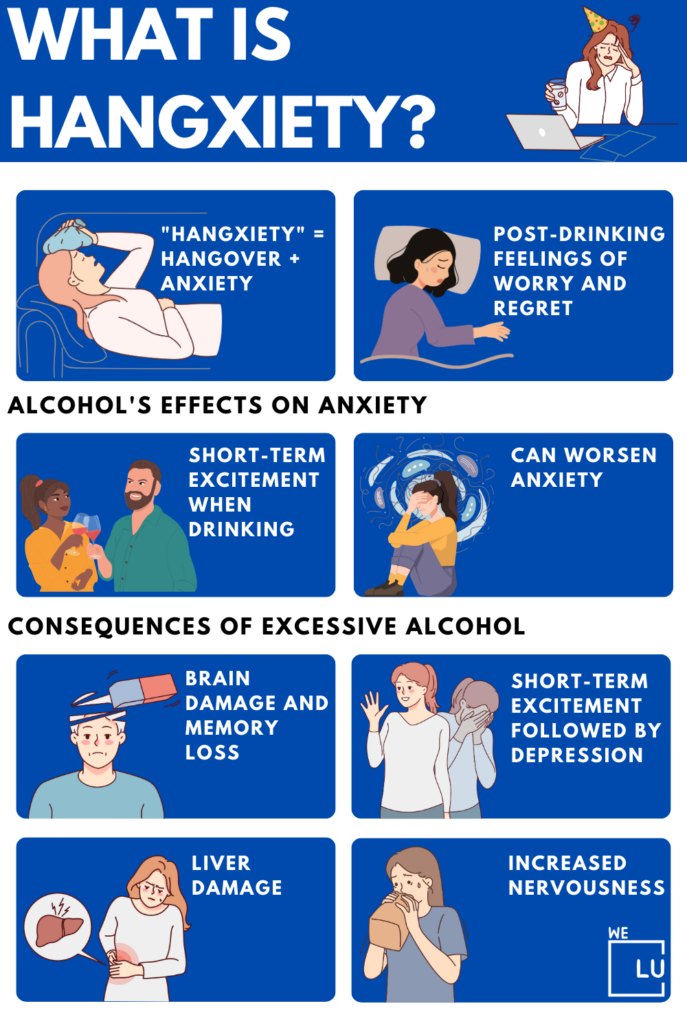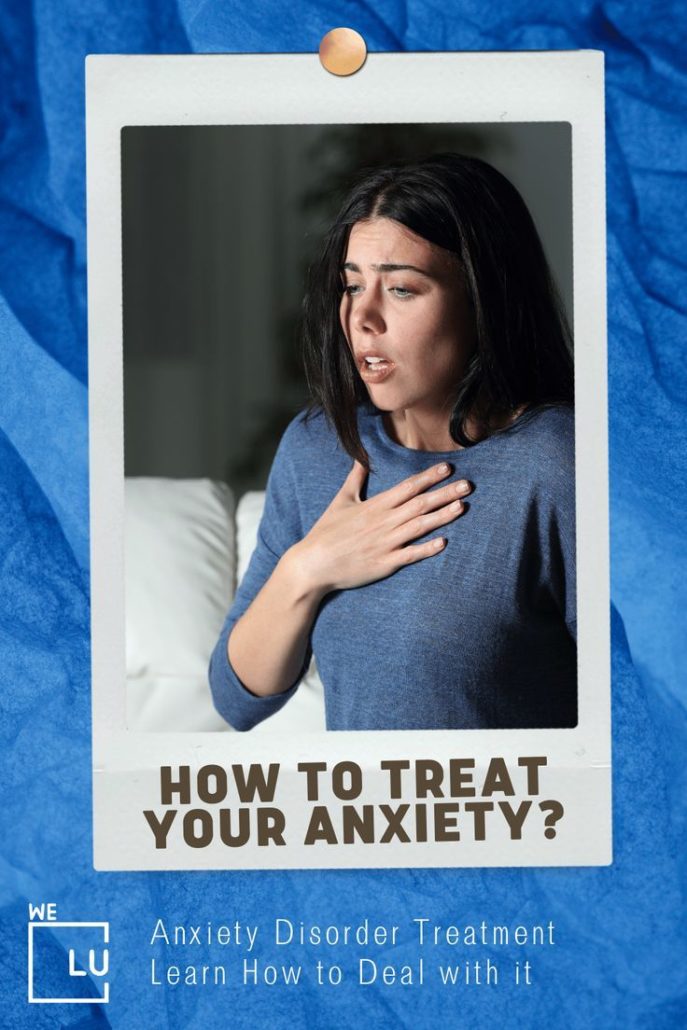The Dangerous Mix of Alcohol and Anxiety – Hangxiety
“Hangxiety” has become a popular description of the uncomfortable feeling that many people feel after drinking too much alcohol. But what does it mean? This wordplay, which is a combination of the words “hangover” and “anxiety,” describes the feeling of worry, unease, or regret that many people have after drinking. In other words, it’s how booze makes you feel after drinking. A lot of people say that when the effects of drinking wear off, they feel worried, guilty, or even panicked. We’ll talk more about what causes hangxiety, how it affects people who drink, and how to deal with or avoid it.
What is Anxiety Disorder?
According to The National Institute on Mental Health, occasional anxiety is a normal part of our life. When confronted with a challenge at work, before a test, or before making a critical decision, you could experience anxiety. However, anxiety disorders involve more than just passing fear or terror.
It’s vital to get anxiety treatment as soon as possible since it does not go away for someone with an anxiety disorder and can worsen over time. Anxiety might influence daily tasks like work performance, academic progress, and interpersonal relationships. Generalized anxiety disorder, panic disorder, and different phobia-related disorders are only a few of the several sorts of anxiety disorders.
Individuals with a generalized Anxiety disorder (GAD) display extreme anxiety or worry, most days for at least six months, about many things, such as personal health, work, social dealings, and everyday life circumstances.
How Does Alcohol Cause Anxiety?
There is some truth to the idea that drinking can help lower stress. Alcohol has both calming and depressing effects on the central nervous system. This is why so many people drink too much to deal with their anxiety and become hooked on it.
People who have an alcohol use problem often say things like, “Alcohol is the only thing that helps my anxiety.” In the beginning, drinking helps to calm down and take your mind off of issues. It might make you feel better, happy, and more at ease. Some of the effects of alcohol are similar to those of drugs used to treat anxiety. So, some people mix anti-anxiety drugs with booze to make the results of both substances stronger, which can lead to severe alcoholism and drug overdose.
If your doctor lets you drink, having a glass of wine occasionally might not be bad for you. But if you start drinking, you might get used to how booze makes you feel better. This could make it even harder to deal with worry and anxiety.
Also, drinking too much booze can be harmful to both the body and the mind. Over time, drunkenness can hurt your brain, make you forget things, make you black out from drinking, and cause other serious health problems like liver damage. These signs of alcohol abuse may make you feel more nervous as you deal with them.
The calm feeling you get after drinking is often caused by how much alcohol is in your blood. BAC levels that rise cause short-term excitement, while BAC levels that drop cause depression. In other words, having a few drinks that raise your BAC before bringing it back to normal could make you feel even more nervous and stressed than you already were.
How To Stop Anxiety After Drinking Alcohol?
If you’ve been through an alcohol anxiety attack before, you probably already have a toolkit of coping mechanisms. However, if you have a throbbing headache or the room spins when you move, you probably won’t go for a stroll, do yoga, or blog about your alcoholic anxiety feelings.
The more you consume alcohol, the more your brain responds to the dose of alcohol it is receiving. If you’re struggling with alcohol use disorder, stopping at one or two drinks may feel impossible. If you think you might have a drinking problem and are interested in seeking help, look for an accredited alcohol treatment center for the best recovery results.
Individuals with unsafe alcohol consumption are more likely to report psychological distress than those with lower alcohol intake. Although depression and anxiety are correlated with alcohol use, the connections may be more robust for depression symptoms.
Both clinical and population-based studies show that heavy drinking is linked to higher depression levels. Anxiety and stress have been found to connect to both alcohol craving and consumption causally. Stress is associated with increased alcohol use/heavy drinking, with a positive association between the number of stressors and alcohol intake. Stress also relates to poorer mental health, and, therefore, the use of negative coping styles, such as increased alcohol consumption, is more likely to develop.
Coping involves using thoughts and behaviors to handle internal and external stressful situations or strategies to manage vulnerability to stressors. Adaptive (problem-focused/active) coping techniques indicate advantageous mental health outcomes and less alcohol use, whereas maladaptive (avoidant/passive) coping styles are associated with increased alcohol use. Furthermore, stressful situations are possibly more easily managed by individuals with high levels of mental resilience. Mental resilience refers to the ability to recover or bounce back from stressful events. High levels of mental strength are associated with lower stress levels and unsafe drinking levels.

Skip To:
Learn More:
- How To Tell If Shortness of Breath is from Anxiety?
- Adjustment Disorder with Anxiety
- Clonidine for Anxiety
- Anxiety and High Blood Pressure
- DMT and Anxiety
- What is the Best SSRI for Anxiety?
- Social Anxiety Disorder Test
- Grounding Techniques for Anxiety Attacks
- Short-Term Disability Mental Health
- Anxiety Disorder Treatment

End the Emotional Pain. Get Your Life Back.
Feeling Depressed, Anxious or Struggling with Mental Health Illness? Get Safe Comfortable Mental Health Dual Diagnosis High-Quality Therapy From Counselors That Care. Begin Your Recovery Now.
Hotline (855) 940-6125We Level Up FL Mental Health Center Tips To Cope With Hangxiety, the adverse effects of Alcohol and Anxiety
✅ Limit Alcohol Consumption: Moderation is key. Reducing your alcohol intake can help minimize the risk of hangxiety and its associated anxiety symptoms.
✅ Stay Hydrated: Alcohol can dehydrate the body, which can exacerbate feelings of anxiety. Drinking water alongside alcoholic beverages and staying hydrated can mitigate this.
✅ Practice Relaxation Techniques: Engage in relaxation methods, such as deep breathing, meditation, or mindfulness, to alleviate anxiety symptoms. These techniques can help you stay calm and centered.

Alcohol Induced Anxiety Explained
Alcohol changes the amounts of serotonin and other neurotransmitters in the brain, which can make anxiety worse. You might feel even worse after the alcohol goes off. When you drink, you might feel anxious for a few hours or even the whole next day.
Getting drunk to treat your social anxiety problem can be dangerous. The Anxiety and Depression Association of America (ADAA) says that about 7% of Americans have problems with social anxiety. Another problem that a lot of them have is that they drink and have social nervousness.
If you have social anxiety, you might not be able to handle going to social events. A lot of people with social anxiety disorder use alcohol as a way to deal with social situations. This could lead to becoming dependent on alcohol when socializing, which could make anxiety feelings worse.
A little over 20% of people who have a social anxiety problem are also dependent on alcohol. Besides needing alcohol to feel at ease when with other people, these are some other signs of alcohol dependence:
- The desire or need for a boozy drink to get through the morning.
- Drinking too much at least four days a week.
- Not being able to go to a social event or party without drinking.
- Not being able to stop drinking.
- Having five or more drinking drinks in a single day.
Overdrinking can also lead to alcohol hangovers. A hangover can cause signs and symptoms that make you feel more anxious, including the following:
- Headaches.
- Dizziness.
- Nausea.
- Dehydration.
- Low blood glucose (sugar).
Get Help. Get Better. Get Your Life Back.
Searching for Accredited Dual Diagnosis Mental Health Centers Near You?
Even if therapy failed previously, or are in the middle of a difficult crisis, we stand ready to support you. Our trusted behavioral health specialists will not give up on you. When you feel ready or just want someone to speak to about counseling alternatives to change your life call us. Even if we cannot assist you, we will lead you to wherever you can get support. There is no obligation. Call our hotline today.
FREE 24/7 Dual Diagnosis Mental Health Services HotlineHangxiety Treatment
How to get rid of hangxiety fast? Begin by taking care of your essential physical necessities:
- Rehydrate. Drink an abundance of water throughout the day.
- Eat a light meal of soft foods. If you’re nauseous, broth, soda crackers, bananas, or dry toast can help soothe your stomach. Aim for whatever whole, healthy foods you like to eat. Avoid fatty or processed foods.
- Try to get some sleep. If you have difficulty sleeping, try taking a shower, putting on some calming music, or diffusing essential oil for aromatherapy. Make your sleeping atmosphere comfortable so you can rest, even if you can’t sleep.
- Try over-the-counter pain reliever. If you have a terrible headache or muscle aches, ibuprofen or other nonsteroidal anti-inflammatory drugs (NSAIDs) can help relieve the pain. Just make sure to take only the suggested dose. Combining alcohol with NSAIDs could lead to stomach bleeding, so you should start with a smaller quantity and see if it benefits before taking more.
Alcohol Anxiety Withdrawal
Increased anxiety is also a sign of alcohol withdrawal. If you’ve ingested alcohol in large amounts for an extended period and abruptly stop drinking, your anxiety can be aggravated by the side effects of alcohol withdrawal. Other alcohol withdrawal anxiety symptoms include:
- Trembling hands.
- Sweating.
- Heart rate over 100 beats per minute.
- Hallucinations.
- Nausea.
- Vomiting.
- Seizures.
Withdrawal has a wide range of signs and symptoms, from mild tremors to a condition known as delirium tremens, which results in seizures and could advance to death if not identified and treated promptly. The reported mortality rate for individuals who experience delirium tremens due to alcohol withdrawal is 1 to 5%.
If the symptoms of alcohol withdrawal do not advance to more severe symptoms within 24 to 48 hours, the patient will presumably recover. However, the time to presentation and degree of symptoms can differ greatly depending on the patient, their course of alcohol dependence, and the volume generally consumed. Most alcohol withdrawal cases should be described by the severity of withdrawal symptoms, not the time since their last drink.
Documenting the time of their last drink is crucial in any patient with an alcohol addiction or dependency history presenting with other complaints. You can help avoid withdrawal by recognizing this: Some features that may increase your suspicion that a patient could suffer severe withdrawal include a history of previous delirium tremens and a history of low platelets (thrombocytopenia) or low potassium levels (hypokalemia).

First-class Facilities & Amenities
World-class High-Quality Mental Health Services & Behavioral Health Substance Abuse Treatment
Rehab Centers TourRenowned Mental Health Centers. Serene Private Facilities. Inpatient Rehab Programs Vary.
Mental Health Helpline (855) 940-6125Proven recovery success experience, backed by a Team w/ History of:
15+
Years of Unified Experience
100s
5-Star Reviews Across Our Centers
10K
Recovery Successes
- Comprehensive Dual-Diagnosis Treatment
- Complimentary Family & Alumni Programs
- Coaching, Recovery & Development Events
- Comfortable Onsite Medical Detox Center
Managing Anxiety and Alcohol Problems
Someone has both a substance use disorder (like alcoholism) and a mental health problem (like anxiety or depression). This is called dual diagnosis, which is also called co-occurring disorders. People who have both anxiety and drinking problems often find that the two conditions make each other worse. To self-medicate or deal with their anxiety, some people turn to alcohol.
This can lead to drinking more and becoming dependent on it. When treating someone with a dual diagnosis, you have to deal with both conditions at the same time because ignoring one can slow down the growth of the other. Integrated treatment plans that include therapy, medication, and changes to a person’s lifestyle can help them deal with both their anxiety and alcohol problems more successfully, which can improve their overall health.
- Manage Physical Symptoms of Anxiety After Drinking Alcohol – In hangxiety (hangover and anxiety), the mind-body connection plays a significant role. While being physically well won’t eliminate anxiety, it can give you more resources to deal with your racing thoughts and worries.
- Mindfulness Meditation to Ease Anxiety from Alcohol – You can meditate to relieve alcohol insomnia anxiety. Meditation can help to begin with some deep breathing exercises, so lie or sit back, close your eyes, and concentrate on your thoughts and how you feel, physically and emotionally. Don’t attempt to judge your thoughts. Avoid them. Merely notice them as they come up into your awareness.
- “Take a Deep Breath” When Drinking Alcohol – Slow breathing can help calm and relax a pounding heart. Breathe in a while, counting to 4, then breathe out while counting to 4 again. Do this for a few minutes until your heartbeat is relaxing. You can also try the 4-7-8 breathing exercises. The 4-7-8 breathing technique can be done by breathing in for 4 seconds, holding your breath for 7 seconds, and exhaling for 8 seconds. This breathing technique aims to lessen anxiety or help people with trouble sleeping.
- Put The Night Into Perspective After Alcohol and Social Anxiety – Stressing about what you might have said or done while drinking repeatedly plays a significant role in alcohol hangover and anxiety, especially if you are mixing anxiety medicine and alcohol. But remember that what applies to you probably also applies to other people. Chances are you weren’t the only one who made an argument or wrong action. It’s also likely that nothing you said or did went unnoticed.
World-class, Accredited, 5-Star Reviewed, Effective Mental Health Dual Diagnosis Programs. Complete Integrated Inpatient Rehab with Free Post Discharge Therapy Planning.
CALL (855) 940-6125End the Emotional Pain Rollercoaster. Gain Stability & Happiness Through Recovery Treatment. Start Mental Health Counseling Today. Get Free No-obligation Guidance by Behaviroal Health Specialists Who Understand Mental Health Recovery.
Alcohol Withdrawal and Anxiety, Timeline, & Treatment
Experience Transformative Recovery at the We Level Up Treatment Center.
See our authentic success stories. Get inspired. Get the help you deserve.



Start a New Life
Begin with a free call to a behavioral health treatment advisor. Learn more about our dual-diagnosis programs. The We Level Up treatment center network delivers recovery programs that vary by each treatment facility. Call to learn more.
- Personalized Care
- Caring Accountable Staff
- World-class Amenities
- Licensed & Accredited
- Renowned w/ 5-Star Reviews
We’ll Call You
Search We Level Up FL Alcohol and Anxiety (Hangxiety) Causes, Risks, & Treatment Topics & Resources
Sources
- 015–2020 Dietary Guidelines for Americans. 8th Edition: Appendix 9. Alcohol. (2015,December)
http://health.gov/dietaryguidelines/2015/guidelines/appendix-9 Alcohol and Anxiety, Hangxiety Related articles - Heavy drinking rewires brain, increasing susceptibility to anxiety problems. (2012,September 4)
http://news.unchealthcare.org/news/2012/september/heavy-drinking-rewires-brain-increasing-susceptibility-to-anxiety-problems Alcohol and Anxiety, Hangxiety Related articles - MayoClinic Staff. (2014, September 25). Generalized anxiety disorder: Definition.Retrieved from
http://www.mayoclinic.org/diseases-conditions/generalized-anxiety-disorder/basics/definition/con-20024562 Alcohol and Anxiety, Hangxiety Related articles - MayoClinic Staff. (2016, April 20). Social anxiety disorder (social phobia): Definition
http://www.mayoclinic.org/diseases-conditions/social-anxiety-disorder/basics/definition/con-20032524 Alcohol and Anxiety, Hangxiety Related articles - Social anxiety disorder and alcohol abuse. (n.d.)
https://www.adaa.org/understanding-anxiety/social-anxiety-disorder/social-anxiety-and-alcohol-abuse Alcohol and Anxiety, Hangxiety Related articles - Tips to manage anxiety and stress. (n.d.)
https://www.adaa.org/tips-manage-anxiety-and-stress Alcohol and Anxiety, Hangxiety Related articles





